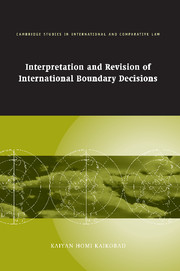Book contents
- Frontmatter
- Contents
- List of maps
- Preface
- Acknowledgments
- Table of cases
- List of abbreviations
- Part I Introduction
- Part II The settlement of territorial and boundary disputes
- Part III Judicial remedies: interpretation
- 3 The interpretation of judgments and awards
- 4 The classification of the notion of interpretation
- 5 Legal issues regarding interpretation
- 6 Principles of interpretation
- Part IV Judicial remedies: revision
- Part V Conclusions
- Select bibliography
- Index
- CAMBRIDGE STUDIES IN INTERNATIONAL AND COMPARATIVE LAW
5 - Legal issues regarding interpretation
Published online by Cambridge University Press: 14 September 2009
- Frontmatter
- Contents
- List of maps
- Preface
- Acknowledgments
- Table of cases
- List of abbreviations
- Part I Introduction
- Part II The settlement of territorial and boundary disputes
- Part III Judicial remedies: interpretation
- 3 The interpretation of judgments and awards
- 4 The classification of the notion of interpretation
- 5 Legal issues regarding interpretation
- 6 Principles of interpretation
- Part IV Judicial remedies: revision
- Part V Conclusions
- Select bibliography
- Index
- CAMBRIDGE STUDIES IN INTERNATIONAL AND COMPARATIVE LAW
Summary
Preliminary observations
Despite the inherent simplicity of this remedy, a number of complex problems can arise with respect to the scope and effect of interpretation. The problems and issues considered below are those which have arisen for tribunals dealing with boundary and territorial delimitation problems. They are discussed in the following five contexts: (1) interpretation and the role of consent; (2) the admissibility of requests for interpretation; (3) the scope and purpose of interpretation; (4) the relation between the interpretative process and res judicata; and (5) the basic principles of interpretation. Although discussed individually below, the problems, it is important to note, have been itemised chiefly for the purposes of presentation. Essentially, they are all doctrinally linked. Item (5) is examined later in Chapter 6.
Interpretation and the role of consent
By way of general observations, it must first be noted that the consent given by States for the adjudication or arbitration of an international boundary problem (or, for that matter, any international dispute) is distinct from the consent given by them allowing for the interpretation of the judgment or award rendered by that tribunal. This is of course particularly relevant in matters of interpretation as incidental jurisdiction. In other words, where States agree to resolve their dispute by way of an international tribunal, that agreement will not in principle extend to allowing that tribunal to give judicial clarification of a vexed portion of the award or judgment.
- Type
- Chapter
- Information
- Interpretation and Revision of International Boundary Decisions , pp. 102 - 174Publisher: Cambridge University PressPrint publication year: 2007

